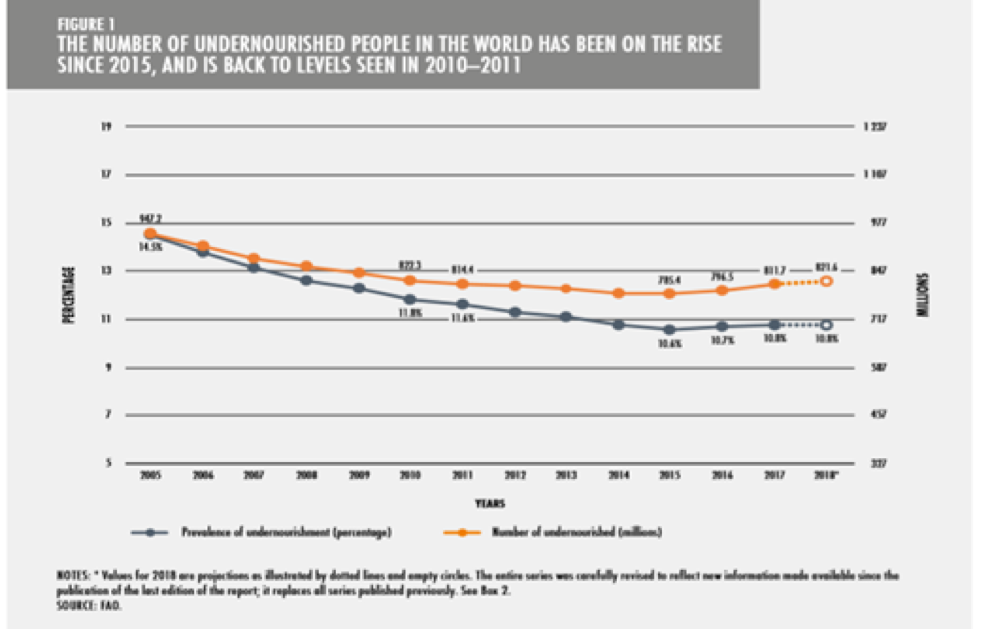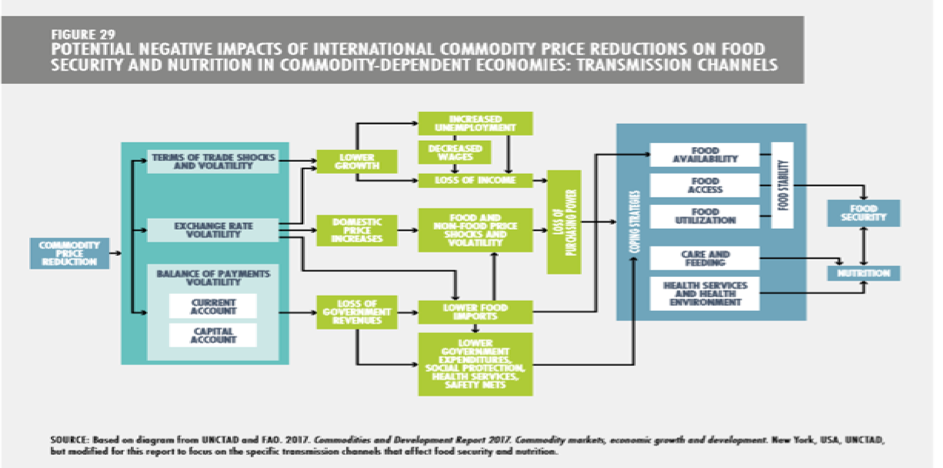Palm oil holds promise for current and future food security
The progress of global food security hinges on the ability of the farming community to efficiently produce sufficient and nutritious food to satisfy local needs and meet growing global demand.
The Food and Agriculture Organisation (FAO) of the United Nations has sounded the early warning that the agri-food sector would need to generate 50 per cent more food in 30 years in 2050 to meet the demand requirements.
Food security is a global serious threat facing millions of households in developing countries especially if one is to figure out how to step up on the food production processes in the face of rising climate change issues and environmental degradation.
This major global challenge is more than just about meeting food demands but also the overarching needs of society and the economy at large.
Palm oil is well recognised as the most efficient vegetable oil globally which can step up to feed the growing population numbers across the world.
Towards this end, palm oil already plays a significant role in alleviating poverty among the rural folk in Malaysia as well as Indonesia and this has inevitably lifted the quality of life of these families enabling them to have better access to education and healthcare.
Just like other governments, the Malaysian government has placed food security as a priority agenda to address at all levels whether at household, national or global levels.
One of the main parameters used to measure the food security level are food supply readiness and the people’s ability to purchase the food and Malaysia has been placed at high levels in these areas.
Elsewhere however, the number of people who suffer from hunger across the world over the past three years has slowly increased, with more than 820 million people in the world still hungry today – that is one in every nine people in the world.

More than 30 per cent of the undernourished in the world live in Africa. It is a region with high potential for agriculture expansion for plantation crops like oil palm that could easily help to reduce poverty, hunger, unemployment and undernourishment. More than 50 per cent of the undernourished live in Asia.

Palm oil is an ideal solution to address global food insecurity challenges which generally refer to the failure to achieve food security, sustainable agriculture, apart from meeting the demand for non-renewable resources
Challenges have also emerged from the Green activism wave from Europe.
These green battles are adding to the food insecurity concerns. They range from hostility towards farmers from climate activists, stagnant revenues to environmental policies that may ban the use of pesticides like glyphosate to support nature-based solutions. Complaints about animal welfare by groups championing vegan lifestyles led to farmers protesting in Germany, France, Netherlands and Ireland.
Strong public opinion has been playing an important role in decisions of European commissioners particularly policies affecting the farmers – a move which outgoing EU Health and Food Safety Commissioner Vytenis Andriukaitis has strongly disapproved.
He has warned that the European Union cannot build a food safety system based on public opinion, setting aside evidence or scientific assessment.
Public opinion has played a key role in the debate on palm oil issues in the EU and its discrimination against the vegetable oil remains.
The just-released European Green Deal announced by European Commission President Ursula von der Leyen provides a roadmap with actions for all sectors of the economy notably transport, energy, agriculture, buildings, and industries such as steel, cement, ICT, textiles and chemicals.
In a recent news report she was quoted as saying that the commission will propose an EU law in March that would “make the transition to climate neutrality irreversible”, adding that the measure will extend the scope of emissions trading, and will include “a farm-to-fork strategy and a biodiversity strategy.”
Some of the proposals include penalising imports from countries with looser emissions controls.
The Environment, Public Health and Food Safety Committee (ENVI) – the largest committee in the European Parliament – approved a resolution calling on the EU to enact a long-term strategy to reach climate neutrality at the latest by 2050.
The Green battles also upset farmers in Asia producing palm oil as the ban imposed on palm biodiesel has categorised it as ‘high’ risk under the Delegated Act due to discriminatory indirect land- use change (ILUC) factors, loss of biodiversity and greenhouse gas emissions.
The Delegated Act which came into effect on June 10 restricts the types of biofuels from palm oil that may be counted toward the EU renewable-energy goals and introduces a certification system.
It has only knelled grave news for the future of the promising palm biodiesel. Palm biodiesel, which is the only feedstock categorised as ‘high risk” hence its use in transport fuel will be phased out by 2030, and it will not be eligible to receive incentives from EU member states.
With that move, the ban will reduce the EU demand on palm biofuels in the long term.
Ultimately, the Delegated Act and other regulations from the EU will form as trade barriers against the imports of palm oil in order to protect the local oilseed crops.
ILUC affects all vegetable oils too. Copenhagen Economics states ILUC occurs when land is converted to cropland through displacement of production in other locations.
The ban on palm biodiesel will increase the production of other low yield crops that will need more land to grow. Palm oil has a high land use efficiency as compared with other vegetable oils such as soybean (8 times more) and rapeseed (5 times more) which means more land will be needed to replace palm oil with lesser efficient crops.
While the EU may claim that the Delegated Act will curb deforestation, it will ultimately lead to more deforestation in other regions as much more land will need to be cleared to plant either soybean or rapeseed.
According to LMC International, if all oil palm expansion was put to a stop, 150 mil ha more soybean land would be needed to meet the gap left by palm oil. The extra 150 mil ha is more than 4 times the entire area under oil palm in 2030.
The Delegated Act induces a more worrying trend of land use change as more low yielding crops will be grown such as soybean and rapeseed resulting in much more land being deforested or cleared.
Instead of creating an efficient agriculture system that supports high yield crops that depend on less land, EU policies will see more land being cleared for in –efficient crops. On average a hectare of oil palm produces 7-8 times as much oil annually as one hectare of soybean.
Due to this protectionist measure, Indonesia and Malaysia, the two largest producers have threatened WTO action.
Indonesia took the first step by filing a lawsuit at the WTO against the EU’s palm oil biofuel policy on 15th December.
Trade wars that are becoming common today and are also an additional factor that will create more protectionism that will have an impact on countries that are dependent on trade. Trade restrictions will remain unresolved as the system to settling disputes may not be able to play an effective role.
One newswire reported that Washington has blocked the world trade body from appointing members to a dispute panel over the past two years, impacting the future of the appellate body. This would mean the number of unsettled disputes will be on the rise. In the final count it will be the trade dependent nations which will suffer the most.
Malaysia should also consider enacting laws similar to US, where the Iowa Governor signed an executive order recently where all new contracts for state-owned diesel vehicles must be purchased from engine manufacturers that can accommodate at least 20 per cent biodiesel. This will help to support the farmers and the country’s renewable fuels sector.
Farmers play an important role in the food chain. If farmers are unable to meet the global demand, prices will increase and eventually people will have excess to lesser quantity and quality of food. Food insecurity will become a problem.
The social benefits of planting oil palm are also much higher as more people are employed in this sector as it is labour intensive. A lot of people are employed in the rural areas, helping to curb migration, providing jobs to develop rural townships and infrastructure. It is a huge contributor to the economic well- being of a country.
Most of the noise against this sector comes from the EU yet it only accounts for less than 10 per cent of the world palm oil demand.
Pressure from green NGOs or consumers over the years have put the spotlight on this commodity which is grown in the tropical countries that still need to develop and depend on commodities like palm oil to provide income and jobs for their rural population.
The farmers are a critical component in ensuring the future of food security, food health and food sustainability.
In the FAO’s Food Security and Nutrition in The World 2019 report, it has distinguished the various levels of food security which exists in the world today.
For instance, moderate food insecurity occurs when people face uncertainties about their ability to obtain food and have been forced to reduce, at times during the year, the quality and/or quantity of food they consume due to lack of money or other resources.
Severe food insecurity affects a community or nation when people have likely run out of food, experienced hunger and, at the most extreme, gone for days without eating, putting their health and well-being at grave risk.
In both instances, food insecurity, which is dependent on farmer’s ability to produce sufficient food can have dire consequences on the economic well- being of a country.


Amongst the factors that affect hunger and malnutrition include economic slowdowns and downturns, world price fluctuations for countries dependent on production of primary commodities and the ability to trade in free and open make which leads to unemployment, affects income and ultimately excess to food.
This is mainly affecting countries dependent on primary commodity exports, in South America, Asia and some countries in Africa.
Low commodity prices may result in depreciation and devaluation of currencies resulting in domestic price increases, including food prices.
This then affects the ability of households to buy food as the cost of food relative to their incomes increases.
Added to this, there are direct and indirect impacts associated with fluctuations in commodity prices ; the direct impacts affects terms of trade, exchange rate adjustments and the balance of payments; and secondary indirect effects impacts domestic prices, including food; unemployment, declining wages and loss of income; and health and social services.
Belvinder Sron, Deputy
CEO, MPOC










Leave a Reply